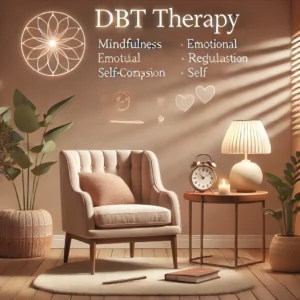Dialectical Behavior Therapy, or DBT, has gained popularity as a structured and effective approach for managing a variety of mental health conditions. Originally developed to help individuals with borderline personality disorder (BPD), DBT therapy now offers coping tools for a broader audience, including those dealing with anxiety, depression, and stress. Whether you’re attending in-person sessions or exploring online DBT, here are ten essential DBT therapy tips to help you along your journey.
1. Practice Mindfulness Regularly
Mindfulness is a cornerstone of DBT therapy. By focusing on the present moment, you can manage overwhelming emotions and improve your concentration. Mindfulness is about observing your feelings, thoughts, and physical sensations without judgment. You can integrate it into daily activities like eating, showering, or walking by simply paying attention to each sensation. Try setting aside a few minutes each day to practice mindfulness—it can make a big difference.
2. Set Realistic Goals with SMART Criteria
In DBT, goal-setting is crucial for progress. The SMART criteria—Specific, Measurable, Achievable, Relevant, and Time-bound—helps you establish realistic goals that you’re more likely to achieve. For example, instead of setting a vague goal like “reduce stress,” try something specific like “practice deep breathing exercises for five minutes, three times a week.” With online DBT, you can often track your goals through worksheets and apps, making it easier to monitor progress.
3. Use Radical Acceptance to Reduce Suffering
Radical acceptance is a powerful tool in DBT therapy. It means accepting things as they are, rather than how you wish they were. This doesn’t mean you agree with or approve of the situation, but by accepting reality, you reduce additional emotional pain. Practice radical acceptance when faced with uncontrollable situations to cultivate peace and focus on things within your control.
4. Take Advantage of Online DBT Resources
The flexibility of online DBT has made therapy more accessible than ever. Many platforms offer virtual sessions, video lessons, and even downloadable worksheets to reinforce DBT skills. Whether you’re looking for individual therapy or group sessions, online DBT can be a practical choice, especially if in-person options aren’t available in your area. It also allows you to practice skills in the environment where you’ll be using them—your everyday life.

An inviting therapy room designed for DBT, with soft lighting, cozy seating, and mindfulness tools, creating a serene space for emotional growth and mental health support.
5. Practice Opposite Action to Manage Emotions
Opposite Action is a unique skill in DBT that helps you manage difficult emotions by acting opposite to what your feelings tell you. For instance, if you’re feeling angry, try to engage in a compassionate or positive action, such as writing a gratitude list. This technique works because actions can influence emotions. Next time you feel a challenging emotion, consider how the opposite action could alter your perspective.
6. Build a Crisis Survival Kit
When emotions become overwhelming, it helps to have a crisis survival kit—a collection of items and practices that can calm you in the moment. Your kit might include a list of coping statements, photos that evoke happy memories, or a playlist of calming music. Both in-person and online DBT therapists encourage creating a personalized kit to manage intense moments effectively.
7. Use the STOP Skill for Emotional Regulation
STOP stands for Stop, Take a Step Back, Observe, and Proceed Mindfully. This DBT skill is especially useful in stressful or high-stakes situations where emotional regulation is essential. By pausing and observing your feelings, thoughts, and surroundings, you avoid reactive behaviors that you might later regret. This skill is easy to remember and can be practiced anywhere, making it perfect for both in-person and online DBT contexts.
8. Practice Self-Compassion to Support Progress
DBT therapy emphasizes self-compassion and understanding. Self-compassion involves being kind to yourself, especially during challenging moments. Many people find self-criticism comes easily, but this mindset can hinder progress in therapy. Replace self-critical thoughts with affirmations like “I am doing my best” or “I am worthy of kindness.” Online DBT programs often include modules or exercises that focus on building self-compassion, which can further reinforce your growth.
9. Improve Relationships with DEAR MAN
The DEAR MAN technique is part of the DBT module on interpersonal effectiveness and is designed to help you communicate assertively. DEAR MAN stands for Describe, Express, Assert, Reinforce, Mindful, Appear Confident, and Negotiate. By following these steps, you can improve communication, strengthen relationships, and advocate for your needs without escalating conflicts. Many online DBT platforms provide worksheets and examples to help you practice DEAR MAN effectively.
10. Celebrate Small Wins to Stay Motivated
Change is often slow in DBT therapy, but celebrating small achievements can keep you motivated. Each time you complete a skill or make a positive change, acknowledge it. These small wins accumulate and build your confidence in the DBT process. Whether you’re working with an in-person or online DBT therapist, reflecting on progress, no matter how small, reinforces a positive mindset and boosts commitment.
Final Thoughts on DBT Therapy
DBT therapy offers practical and actionable tools to help manage intense emotions, improve relationships, and enhance overall mental health. With the rise of online DBT, therapy is now more accessible and adaptable to diverse needs. Remember, DBT skills require practice and patience, so give yourself time to incorporate these techniques into your life. By following these tips, you’ll be better equipped to handle life’s challenges with resilience and balance.
SEO Optimized Content Recap:
Keywords:
- Primary: DBT Therapy, Online DBT
- Secondary: Mindfulness, Radical Acceptance, Emotional Regulation, Interpersonal Effectiveness, Self-Compassion, Opposite Action

